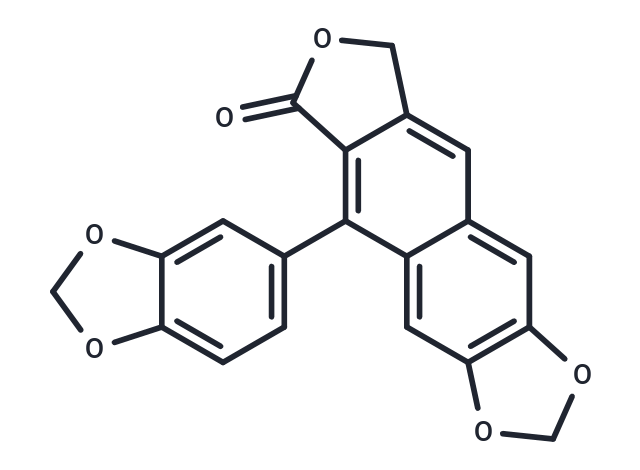Shopping Cart
- Remove All
 Your shopping cart is currently empty
Your shopping cart is currently empty

Taiwanin C is a compound extracted from the Taiwan plant Cryptocarya chinensis, which belongs to the lignan class of compounds and has many biological activities such as anti-inflammatory, antioxidant and anticancer. The Taiwanin C can inhibit the production of inflammatory mediators and oxidative stress in cells.

| Pack Size | Price | Availability | Quantity |
|---|---|---|---|
| 5 mg | $1,850 | Backorder | |
| 1 mL x 10 mM (in DMSO) | $2,200 | Backorder |
| Description | Taiwanin C is a compound extracted from the Taiwan plant Cryptocarya chinensis, which belongs to the lignan class of compounds and has many biological activities such as anti-inflammatory, antioxidant and anticancer. The Taiwanin C can inhibit the production of inflammatory mediators and oxidative stress in cells. |
| Targets&IC50 | COX-2:9.31 μM, COX-1:9.31 μM |
| In vitro | Taiwanin C (1-60μM,24h) demonstrated a dose-dependent inhibition of cell viability specifically in T28 cells, while it had no impact on the normal N28 cells. Treatment with Taiwanin C dose-dependently suppressed the migration ability of T28 cells, as assessed by wound healing and migration assays. Additionally, Taiwanin C decreased the levels of β-catenin, as well as its downstream metastatic proteins Tbx3 and cMyc. Furthermore, Taiwanin C hindered the nuclear accumulation of β-catenin and facilitated its degradation through a pathway involving proteasomes. Moreover, Taiwanin C enhanced the activity of GSK-3β and reduced the levels of phosphorylated (p-ser9) GSK-3β, thereby inactivating the Wnt signaling pathway. In summary, Taiwanin C impeded the cell migration effects of T28 cells by activating GSK-3β, which led to enhanced protein degradation and reduced nuclear accumulation of β-catenin.[1] |
| In vivo | Taiwanin C (20 mg/kg/d, 30 mg/kg/d, 15d; injected) showed effective anti_x0002_tumor activity in nude mice models.[1] |
| Molecular Weight | 348.31 |
| Formula | C20H12O6 |
| Cas No. | 14944-34-4 |
| Smiles | O=C1OCc2cc3cc4OCOc4cc3c(c12)-c1ccc2OCOc2c1 |
| Relative Density. | 1.31g/cm3 |
| Storage | store at low temperature | Powder: -20°C for 3 years | In solvent: -80°C for 1 year | Shipping with blue ice. |

Copyright © 2015-2025 TargetMol Chemicals Inc. All Rights Reserved.